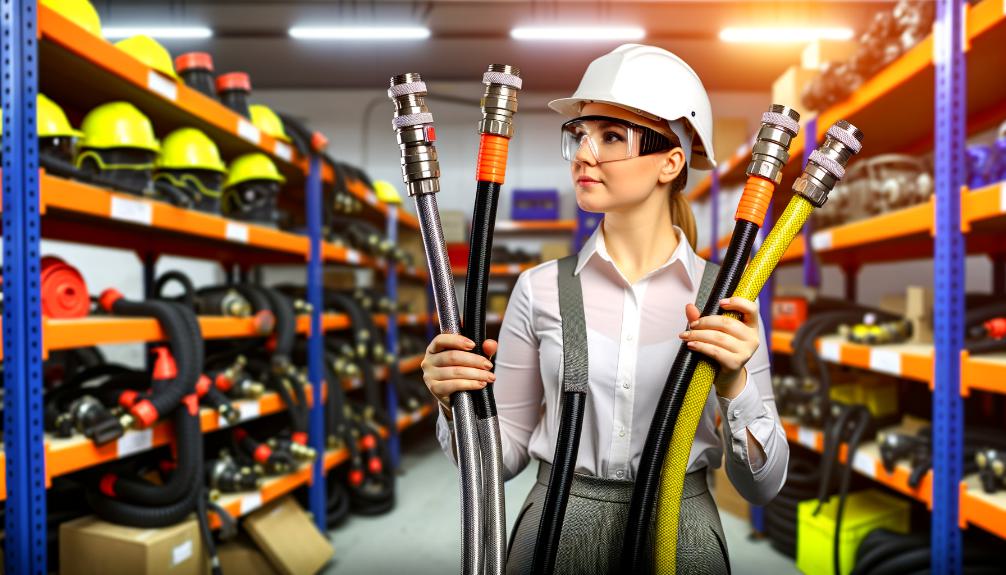
To enhance composite hose safety, you should consider obtaining certifications such as ISO 9001, ATEX, and API Spec Q1. ISO 9001 guarantees reliable quality management practices, emphasizing continual improvement and customer satisfaction. ATEX certification is vital for safety in explosive atmospheres, aligning with stringent European Union regulations and enhancing marketability. Meanwhile, compliance with API Spec Q1 is essential for manufacturers in the petroleum and natural gas industry, focusing on quality assurance and specification alignment. These certifications will not only improve safety standards but also broaden your market access. Further exploration can provide deeper insights into their extensive benefits.
Understanding ISO 9001 Standards
Understanding ISO 9001 standards is essential for ensuring that composite hose manufacturers meet consistent quality management practices. As you explore these standards, you'll find they serve as a framework to enhance your organization's efficiency and customer satisfaction through standardized procedures and continuous improvement mechanisms.
ISO 9001 is centered around the principle of quality management systems (QMS) that are based on several quality management principles, including a strong customer focus, the motivation and implication of top management, the process approach, and continual improvement. Adhering to these principles helps you streamline your operations and reduce wasteful practices.
The certification process itself involves a rigorous audit by an accredited third party. You'll need to demonstrate your adherence to the processes outlined in ISO 9001, which includes documenting your procedures and maintaining an effective QMS. This is vital not only for compliance but also for identifying areas where you can enhance operational efficiency.
It's important to remember that achieving certification isn't merely about having a certificate to hang on the wall. It's about embracing a culture of quality that permeates every aspect of your operations, from production to customer service. Therefore, investing in this certification process can greatly bolster your reputation and competitive edge in the market.
Benefits of ATEX Certification
Achieving ATEX certification provides numerous safety and compliance advantages for companies operating in explosive atmospheres. This certification guarantees you comply with stringent European Union regulations concerning explosion protection, greatly reducing risks associated with flammable gases, vapors, or combustible dusts within your operational environment.
ATEX certification categorizes work areas into specific Zone classifications, which denote the frequency and duration of the presence of explosive atmospheres. You'll find that understanding these Zone classifications allows you to implement appropriate safety measures tailored to the level of risk in each area. This precise demarcation helps in the strategic placement of safety equipment and in designing workflows that minimize the potential for ignition sources in high-risk zones.
Furthermore, obtaining ATEX certification not only enhances safety but also boosts your marketability. You'll gain a competitive edge in the global market, as compliance with ATEX directives is often a prerequisite for trading within and among EU countries. Compliance demonstrates to potential clients and partners that you prioritize safety and adhere to internationally recognized standards.
Importance of API Spec Q1 Compliance
Adhering to API Spec Q1 is vital for manufacturers to guarantee quality management systems meet the rigorous demands of the petroleum and natural gas industry. This standard serves as a framework for organizations to develop processes that ensure product quality and reliability. You'll find that this compliance not only enhances operational efficiencies but also greatly mitigates risks associated with product failures.
API Spec Q1 focuses on specification alignment, which is important for you in maintaining the integrity of your manufacturing processes. It requires a thorough review of your procedures to ensure they align with industry standards and best practices. This alignment is crucial for achieving consistency in product quality across all production cycles.
Moreover, the certification emphasizes quality assurance. By adhering to API Spec Q1, you're committing to continuous improvement in your systems and processes. This involves regular audits and corrective actions that help identify and eliminate non-conformances, enhancing your product's reliability and safety. Maintaining this compliance not only helps you meet legal and contractual obligations but also builds trust with your customers by upholding high safety and quality standards.
Conclusion
You must guarantee your composite hoses meet ISO 9001 standards to ensure quality management throughout production.
Securing ATEX certification is essential as well, especially if your operations involve explosive atmospheres, enhancing safety and compliance.
Lastly, don't overlook the significance of API Spec Q1; it signifies your adherence to stringent quality specifications in the oil and gas industry.
By prioritizing these certifications, you safeguard operations, fortify reliability, and uphold industry standards, ultimately protecting your business and workforce.
© copyright 2024. All RIghts Reserved
